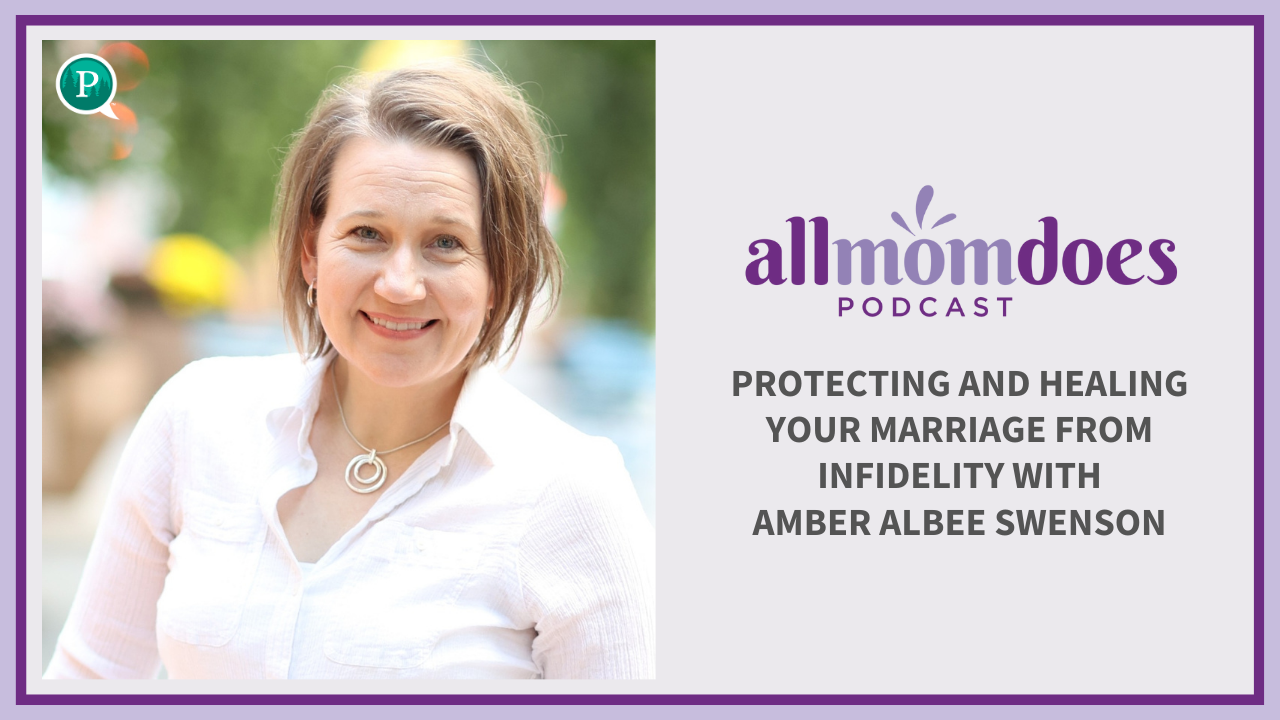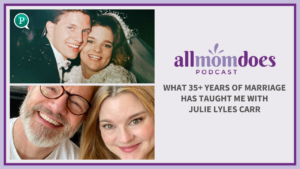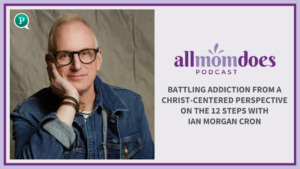They are statistics that are tough to read. 1 in 5 men and 1 in 8 women are unfaithful in their marriages today. Ministry leader, author, and podcaster Amber Albee Swenson joins AllMomDoes host Julie Lyles Carr for a frank conversation about the five stages of infidelity, what healing looks like from that heartbreak, and how we can take steps to safeguard our own hearts and our marriages on this special episode.
Show Notes:
Find Amber: Online | Instagram | Facebook
Find Julie: Online | Instagram | Facebook | X | Pinterest
Find AllMomDoes: Online | Instagram | Facebook | X
Transcription:
Amber Albee Swenson:
Whatever those qualities are that you’re thinking, oh, that person is someone I would like to be with, what are those qualities? Is it because he has a soft tone? Well, is your husband harsh with you? Start praying for him to get over his anger issues. Start seeking ways. Find him a podcast about men in controlling their anger. Is it because the person’s really fit and your husband’s lost some of his shape? Well, maybe you should suggest that you two start walking together. Maybe you start working to make healthy meals. Put the time investing in your marriage instead of daydreaming about somebody else’s.
Julie Lyles Carr:
You’re listening to the AllMomDoes Podcast, part of the Purposely Podcast Network. And I’m Julie Lyles Carr, your host. We are in our seventh season, which is just wild to consider. I can’t believe it. And as we’ve been looking at guests and conversations we want to have in this seventh season, when this landed in my inbox, I knew I had to have this person on. Amber Albee Swenson, thank you so much for being with me today.
Amber Albee Swenson:
I am so happy to be here. Thank you for the opportunity to speak to your audience.
Julie Lyles Carr:
You have such a beautiful ministry, lots of books. You do all kinds of different things in media. I just love all of the things that you do. We’re going to be talking about a sensitive topic today, so I want to give the listener an opportunity. We are going to be talking about marital issues, challenges in marriage, so if that’s something that you feel like you want to put in those earbuds, if you want to put on those headphones, depending on where you are and who might be listening in the background, I want to give you that opportunity to do that right now. And while they’re doing that, Amber, I want you to tell me where you are in the world and give me a little bit of detail about your life, how you’ll do things day to day, all of that.
Amber Albee Swenson:
Yeah. I live in Rochester, Minnesota. So I’m in the Midwest where it’s nice and cold this time of year. And I have a family of six, so there’s four children. Age range, 15 is my youngest, and 23 is my oldest. My first wedding occurred, it’s my third child or my second child, but my first wedding occurred last summer and my third graduated from high school. So my husband and I are at the point of looking ahead to the empty nest years. We have a couple of years to go, but we’re getting to the verge. And by the way, it’s my 27th wedding anniversary today, so this is very apropos.
Julie Lyles Carr:
That’s amazing. Oh, congratulations. That’s amazing.
Amber Albee Swenson:
Thank you.
Julie Lyles Carr:
We’ve just been in that stage too, where we still got kids at home when we’re still actively parenting, but we have four who’ve gotten married over the last two and a half, three years. And it is a whole other thing where you’re like, “Oh, I’m going to need some tools for this phase of parenting” because this is kind of fresh and new and different.
Amber Albee Swenson:
So true, so true. We’re always constantly changing. Once you think you have motherhood figured out, then they switch to the next stage. So you get to be on your toes and on your knees again.
Julie Lyles Carr:
Absolutely. And it requires a whole new set of tools as I’m learning.
Amber Albee Swenson:
That’s right.
Julie Lyles Carr:
So we’re figuring it out. Well, on the podcast, often Amber, we are talking about things like parenting, like kids and all those different places and stages, everything from having babies to launching them and beyond. But we also like to spend some time on marriage on those relationships. And we are in a season where we are seeing a lot of things that we used to assume that marriages that had a faith base would have some type of inoculation to, not to say it was completely immune, but some kind of inoculation to. And when your publicist reached out and I began to review the topic that you were positing, I thought, “Man, I really want to take some time with Amber to talk about this because I’m seeing more and more of it.” And what we’re going to be talking about is the issue of marital infidelity and how it is on the rise, how there are statistics that we need to be paying attention to. How did this topic come into your heart to be something that you wanted to be talking about to people and explaining and giving tools for?
Amber Albee Swenson:
Yeah, so I’m part of Time of Grace. We’re a media ministry and this is something that they chose to talk about. So my colleague, Dr. Pastor Mike, Dr. Pastor Mike Novotny, wrote a book called God’s Blueprint for a Happy Home, and he did a sermon series on it. And that’s when it became clear to me. I did not realize the statistics that we were dealing with. One in five men, one in eight women will encounter infidelity in their marriage. I was absolutely blown away, and so Pastor Mike and I were able to have a chat about it. I read his book and dug a little deeper and found that, like you said, this used to be something that you didn’t really know people, especially in the faith community that this happened to. And now we all know people that this is happening to. And unfortunately, it’s even happening in leadership in Christian circles, which is unfortunate as well.
Julie Lyles Carr:
Yeah, we’re seeing it more and more, and it’s probably one of the lead questions that I’m asked about when I am with someone who is not necessarily in a faith community or is wrestling with their faith or exploring faith for the first time. I have to tell you, Amber, it’s one of the first things that comes up, which is, well, what about all of these celebrity leaders and people in Christian music and people in Christian publishing who this has been the story in their marriage? And I have to admit, there are times that yes, we are all human. We all have the capacity for sin and for issues like this, but it does make those conversations complex. As I was sharing with you before we got onto the mics, I have been just wrestling a little bit of a saddened heart because I was in vocational ministry for so many years, specifically serving women.
And in the time since I released that position, I have been really saddened to see several of the marriages that I really looked up to, I thought were so great couples with young children who both seem to be very engaged and family life and with each other and with their faith community, I’ve seen these marriages bust up due to infidelity, and it has been a number I would’ve never expected. Do you think that we’re seeing now that we’re a few years post COVID, post the Pandemic, we were seeing some numbers during the pandemic that were giving us some concern about marriages? We were seeing separations, those numbers were going up, we were seeing divorce numbers go up. Do you think there’s a little bit of an effect from post-pandemic era or some of the stresses that marriages went through during that time that may be impacting what we’re seeing today, or are we far enough out yet to really know if there’s any kind of correlation?
Amber Albee Swenson:
I don’t have any stats to back it up, but I will say that a lot of, even my friends and people that I know, their whole life changed in terms of men or women or both who used to leave and go to work are now in the same house working from home all day long, and that changes everything drastically.
Julie Lyles Carr:
Right.
Amber Albee Swenson:
You used to have friends that you saw at the office, especially for men, they leave the house, they go have lunch with their buddies, they get out a little bit. When they sit in their house all day long and they don’t have anything to do … I remember one of my friends saying, “If my husband comes up during his lunch hour and rearranges a closet one more time, I’m going to die.”
So absolutely, I think the restrictions that were put on us, and they weren’t things that we asked for, we didn’t say, I’d love to spend more time at home, so I would really like to just sit in an office all day, or I’d like to just commute from my bedroom downstairs to my living room, and that’s enough for me. We have emotional and community needs that a lot of times aren’t met if we’re just isolated. And that can lead to all kinds of problems including health because we’re not getting the exercise and then our mood is affected. And yeah, does that strain marriages? Absolutely.
Julie Lyles Carr:
Yeah. We may be seeing some of the effect of that. Now, of course, this was not an issue that was only isolated to the things that we were going through the pandemic. We knew these things were happening before. Talk to me about what you typically have found in the research you’ve been doing on this that leads to these things happening. As you and I were talking pre-interview, and I love that you brought this up, it’s not necessarily that the affair is the actual core of the problem. It often is a symptom of some things that have been going on.
Now you and I both know people who’ve gotten completely surprised and really thought they had a healthy marriage. That was what was being presented to them and then got really shocked. But there are people, and I’ve had people in my life who’ve said, “I can look back now and I can say, oh, okay, there were these things that were going on and this ended up being the expression.” So what are you typically seeing in terms of a pattern when it comes to infidelity entering the chat?
Amber Albee Swenson:
Yeah, Pastor Mike gave me five, and once he identified them, I went, “Yep, that’s it right there.” So the first one is a deprivation of some sort. It doesn’t have to be sexual, it could be emotional, it could be physical, it could be emotional, it could be something in the marriage that you’re just not doing. Sometimes you’re not making time for each other just to even go spend time and catch up with your day. You’re so involved in the kids. You’re going to sports, you’re doing all the things, you’re putting in all the time, but you’re not spending time on your marriage at all. So there’s a deprivation of some sort there that allows Satan just the little hole that he needs that the next step is attraction. You find attraction in someone else. It’s another woman. It’s a woman at church. It’s a woman coworker or male.
It could happen to a woman too. And there’s an attraction, there’s a spark. There’s something that you kind of do get along, and that leads to intention. All of a sudden you start intentionally putting yourself in that person’s line of vision. So you send the email, you send the text, you deliberately go to lunch with them or work the days that they’re working. There’s that intentionality, which leads to an emotional connection. Now you’re talking to them about things that you probably shouldn’t be talking to anybody but your spouse about. You’re having problems with your child at home and you’re talking to them instead of your husband or the loneliness that you’re feeling because your husband does work a lot. You’re talking to this person instead of going to your spouse. And then there’s a connection. And sometimes that is something as simple as a brush against the other person or touching them on the shoulder, or it’s just some physical connection, and sparks fly.
And a lot of people will say that they’re as taken off guard as anybody that they never were looking for an affair, but they went down these steps blindly without realizing they were doing it, and all of a sudden the person brushed against them, which led to a kiss. And the next thing you know, boom, full-on affair. So what I like to say is recognize the deprivation right now. And even as you’re listening, if there’s even a little something in your heart that goes, yeah, we have not been spending time together, or I don’t feel as connected as I used to be, or there’s an issue that comes up over and over and over in your marriage and every six months you have this blow up because of this, whatever it is, don’t keep putting it aside thinking that somehow it’s going to get better down the road. No, the grass is always greener where it’s watered and fed.
So the point is, at any one of these places, even if you’ve already made it to the emotional connection, you can turnaround. And that’s one of Pastor Mike’s big, big takeaways is don’t … Look, if you’re headed down this path for an affair and you think that it’s going to be all pleasure and it’s going to be the answer to the happiness that you’re looking for, it’s not. It’s like a bomb going off in your life. Think of David and Bathsheba. It was fun for one night and then all of a sudden, all the consequences, all these things came and it became this path of how do I get out of this, and you’re in deeper and deeper and deeper. And that example’s in the Bible for us to learn from that turn around, start working on your marriage.
I like to tell women, when you sense an attraction to another man, that should be your wake-up call. And instead of spending the time looking at them, and I don’t care if it’s a movie star or someone you’d like to listen to or whatever it is, when that person pops into your mind, pray for your husband, whatever those qualities are that you’re thinking, oh, that person is someone I would like to be with, what are those qualities? Is it because he has a soft tone? Well, is your husband harsh with you? Start praying for him to get over his anger issues, start seeking ways, find him a podcast about men and controlling their anger. Is it because the person’s really fit and your husband’s lost some of his shape? Well, maybe you should suggest that you two start walking together. Maybe you start working to make healthy meals, put the time, invest in your marriage instead of daydreaming about somebody else’s.
Julie Lyles Carr:
One thing I do, we do a disservice within our faith communities within some of our conversation. Now, I love the idea of thinking there’s the one, the one that God had for me that he put us together. And when I look at my relationship with my husband, that is part of the romance of it for me. When I see the places, all the things that had to happen for us to end up together, I’m also cognizant that when we are pragmatic and we are committed to the concept of marriage, that ideally, we should be able to make it work with a wide variety of people if we’re both dedicated to Jesus and we are wanting to live our lives in a certain way and we’re dedicated to our families. But part of where I think we’ve done a disservice, whether you believe in the one model or you believe in more of a pragmatic, you can make it work with whoever kind of thing, one thing I think we don’t talk enough about is that even when you are deeply in love with a spouse, even when things are going well, it doesn’t mean that you won’t find yourself at times deciding or seeing that there’s something of a spark or an attraction to someone.
And that’s not the moment, that is the point of problem. It is the moment of not preparing ahead of time to understand that can happen and to then use that moment to think, oh, well then maybe something is wrong. Maybe something is missing in my marriage. And that I think we don’t do a good enough job preparing people for is that there are a lot of things in a lot of different people that we may from time to time, even in different seasons of our lives find to be attractive. It’s what we do next. Those conversations just don’t seem to be happening that much. Do you think in some ways we’ve over romanticized Christian marriage in a sense or we’ve leaned too hard into other profiles about what it should look like? I mean, why are we landing at times kind of stunned and surprised that there can be attraction or a spark with someone else?
Amber Albee Swenson:
Julie, I think one of the biggest disservices we’ve done is among women, and maybe it’s just my friends, this is just something that we’ve been talking about recently. We’re not talking, we’re not talking together. We’re doing all this alone and we’re all trying to pretend that we have it together. So two of my colleagues at Time of Grace, Pastor Mike and another podcaster, [inaudible 00:16:29], they both did series on sex. And I said, “Good for you. That is something I’m not touching with a 10-foot pole.” And I did that for a while and then this book came up and part of it is sex. And so before I did my interview with Pastor Mike, I was on a walk with two friends and I said, “Guys, we’re going to talk about sex. What would you want me to know?” Do you know that’s the first time I talked to friends about sex and the things that they told me, I thought, Amber, women need to be talking with each other. This is ridiculous. What are we doing?
And since I’ve brought this up, I told him this in my interview with him, I said, “I talked to women for the first time. Other friends have come forward and told me things about their sex life and I mean all kinds of things, how sex changes after children, how sex changes with menopause, how it didn’t work in the beginning. Where do Christians go when your sex life isn’t what you were hoping it would be? Who do you go to for advice?”
The romanticism, I think, only continues when we are in silence and struggling and thinking everybody else knows what we don’t know, and so we’re just quiet because our life isn’t what we hoped it would be, but we figure everybody else has it all figured out. And then when you feel that attraction to someone else, oh my goodness, you don’t want to tell another Christian because they’re going to think you’re the worst person in the world. Instead of going to another Christian and having them say yes, and you know what you need to do right now, you need to take that attraction and you need to guard against it.
So it’s okay you felt that attraction and you just admitted it. So you’re saying to Satan, “You’re not going to have dominion over this part of my life. What I’m going to do is I’m going to make sure that I only am with that person in a group of people. I’m going to protect my marriage by not texting that person. I won’t be alone with that person. I’m going to take the time to build my husband up. I’m going to work on our relationship so I don’t have that deprivation.”
It’s not a sin to feel the attraction, like you said, that is just the first sign that maybe I need to work on my marriage.
Julie Lyles Carr:
Yeah. Yeah. I think that’s incredible. And I have to tell you, I mean even in my tenure in ministry, in vocational local ministry, it was really tricky to have those conversations and I’m pretty straightforward on all of it and really wanted to be pretty blunt and bold about a lot of it. But I saw colleagues who got really called out. I even had a colleague who lives a few hours from here, had been in ministry for many years, and because this person used the actual biological terms, what ended up being fired.
Amber Albee Swenson:
Oh, man.
Julie Lyles Carr:
And I thought, if we are not doing this in our faith communities and doing it well and being the ones who are bold and talking about these issues, we are only to your point, propagating and continuing a complete playground for the enemy to trick us, to get us into all kinds of situations that we did not anticipate coming. Let me ask you this, Amber. One thing that I think has been interesting for our generation as I look back to what would be required to, and this is going to sound like a strange word, but to successfully pull off an affair, an infidelity.
There was a certain level of intention that seems like it had to be a little more targeted in years past. I’m pretty saddened and fascinated by the fact that with social media people that we may have known in our past, previous people we dated, someone we had a crush on back in high school, whatever the thing is, our access to those people is a lot simpler to achieve today. And creating means of communicating with people in that way is also a whole lot simpler. Do you think we’re seeing some side effect even of just where our technologies and some of the conveniences we have plus the privacies, if you will, of each of us having our own phone and our own phone number so there’s not just a household phone anymore that somebody would have to risk calling or whatever? How is all of that playing a role in what we’re seeing today?
Amber Albee Swenson:
Yeah, it requires a lot of understanding the responsibility that goes with it. I just had a work anniversary recently and on LinkedIn, four or five men reached out to me and congratulated me and talked to me about my podcast. That’s not a bad thing, but how I respond to men is very cut and dry. “Thank you for listening. I appreciate it.” When a woman contacts me in my email or what have you, and says, Hey, Amber … She’s going to get my heart right. So yeah, it is easy to contact people of the opposite sex, but it’s also our responsibility to not go looking what was David’s problem, he stood on that roof. Looking at Bathsheba, we do not have to spend our time looking up our old loves. You know how your time would be better spent? Getting close to your savior and working on your relationship. And that goes beyond, I’ve talked about working on it … Go get marriage counseling, go talk to a Christian friend who will pray with you and will help you and will tell you what has worked for her.
Yes, it is easier with social media, but let me tell you something else. Let me tell you why it’s important for us to talk about these things because especially the younger generation, they’re getting all their information on social media. They don’t have to ask, how should I have sex with a man? They’ll just look it up and they’ll get all kinds of responses that have nothing to do with the Bible and Christianity, which is why our silence is not helping, and I’m so sorry for that person in ministry who was fired for using those biological terms. They’re all over the internet. If we can’t start being real as a Christian community and letting young people come to us, they’ve seen the biological terms, they’ve seen far more, they are far more informed than I ever was at their age, and they are unabashed about it.
I mean, they know, they’re taught in schools now at a very young age, sex terms that we never discussed. So I think the Christian community is called to wake up in a good way. It’s not that we should be blaring this in front of small children, but there’s a time and a place for us to have these conversations in ways that honor and glorify God.
Julie Lyles Carr:
Absolutely. Talk to me about once an infidelity is discovered in a marriage, what are you seeing in terms of what happens next? I think that for maybe a lot of us, or maybe we’ve had loved ones that have walked through this, that that becomes the moment that for a lot of couples it’s over, and yet I am hearing, I feel like more and more stories of people being able to recover from affairs, and in some ways, that kind of feels like a fresh thing that we haven’t necessarily had the tools before to help couples get there. So what are the outcomes and what are the possibilities for recovery?
Amber Albee Swenson:
You are absolutely right. A lot of marriages actually, if you’re willing to put the work in … Pastor Mike uses the equation time x work x work, which means they say that it takes approximately two years to get to the point of feeling like you have recovered somewhat from the affair. So it is not going to happen overnight. If this happens, you are going to feel like a bomb went off. And I would say first things first, don’t try to do this alone, there’s no way you can. If you’re a woman listening and you just found out or you’re walking through this, you need your best friends, your best Christian friends, and you need counseling and you need individual counseling and marriage counseling.
But as you said, there is hope you can work through this and get to the bottom of those issues. A lot of times people come out in the end way stronger because as you said, they look back and they go, “There was deprivation. We were not taking time for our marriage. We were not investing in ourselves. We are investing in everybody around us but us.” And so there is hope. There is good reason to hope, but it is not going to happen overnight, and it’s going to be work on both parts because the person who had the affair has their things to work on, but the person who was cheated on is going to have to work on forgiveness and not going to hold that over their head. You can’t move forward if you continually bring up the person’s sin. None of us can do that. None of us can live under that weight.
So it’s going to be a matter of walking with Christians who give us both grace and truth. There are times we’re going to need the grace. For the person who was cheated on and they feel guilty for the 80th time, you’re going to say, “God forgave the sin.” But for the other one who’s like, well, it’s up to him to do all the work. “No, we both contributed to some of these problems that brought us into this deprivation. Let’s both work really hard to get to a place that this will never happen again.”
Julie Lyles Carr:
Amber, give a word of encouragement to the woman who is not the one who got cheated on but is the one who cheated because statistically, it’s a little less common, and yet we’re seeing it accelerate. I know that in my experience, I was seen women in a way that my early psych degree had never prepared me for, which was what we were calling the walkaway wife syndrome, women who were walking away from marriages, from kids, all the rest and sometimes into the arms of someone else, and it was something that seemed pretty historic, something that we really had not seen in the numbers that we were now seeing in the last five to 10 years. How does that woman face her faith community face? What has happened? Because it still feels like we sort of see that a little bit differently. If the guy wanders, it’s kind of this little bit of a stereotype, but if it’s the woman, I think sometimes consciously or not, we still see it a little bit differently.
What’s the encouragement for her to stay engaged in community for her to heal her marriage and deal with what happened and what her part was?
Amber Albee Swenson:
Yeah. Look at two places in the gospels, the woman at the well and the woman caught in adultery. Jesus went to both of them. So the first thing I would say is you belong in God’s kingdom, that you’re not an outcast. There’s a place, I mean, I think it’s pretty instructive that there were two places in scripture where God showed us this as if to say, yeah, it happens, but this isn’t the unforgivable sin and let’s repair what was damaged and let’s go on. To her, I would also say, man, it’s easy. I can see how it happens. Having a family is hard. I mean, who hasn’t ever had the thought of, man, I could just walk away from all of this and just start over. It’s a temptation. We just don’t want to go down that temptation. Marriage is hard. Raising kids is hard. Trying to hold it all together is hard. That’s a whole nother conversation I think everywhere I go.
I was just speaking at a church yesterday and I had a woman come up to me and said, “Amber, I don’t know how to do it all. I just went back to work because my youngest child’s in school and I am trying to do the work I’m trying to …” And I said, “I don’t think there’s a place in scripture that says we’re supposed to do it all.”
“And if I could give you anything advice,” I said to her, “maybe see where you could do with less so you don’t have to work so hard. Maybe don’t work 40 hours a week. Could you work 20 and make things happen? Because you will not regret the time you invest in your family.” And if we are pushing ourselves as women and as moms to the breaking point, let’s examine how we could do life differently. We don’t need the new car, we don’t need the bigger home. Maybe we need more peace. So to that woman who walked away, let’s look at what led to that. Let’s learn my whole life is a matter of learning what I’ve done wrong and going, “Lord, I wish I would’ve figured that out sooner, but thank you for showing me now, help me to do better, and thank you for your grace. That overwhelming grace that meets me every time I get it wrong,” and says, “Amber, I’m here with open arms. Come back. Let’s do it different.”
Julie Lyles Carr:
Right. Right. Absolutely. Now, we talked about these five stages that we see in this really pivotal staircase that can lead to some pretty dark corners, and we identified that deprivation is sort of that initial landing where we begin and then these things filter from there. How do we safeguard potentially from even getting to that point of deprivation? Now, I think every marriage is going to have times if you’ve got a newborn in the family. I mean, sometimes you just got to grid out some periods of time where it’s not going to be the easiest to focus in the way that would be optimal. But I feel like Amber, so often when we talk about safeguarding, it’s sort of like, “Have date night.” Well, but there’s some other things that really can help safeguard that can either put enough gas in the gas tank to be able to withstand sometimes of necessary deprivation when it comes to certain seasons in life, or help us avoid that place altogether if possible. What are some tools that we can use in that safeguarding place?
Amber Albee Swenson:
So I think there’s internal and there’s external. So let start with the external. I work closely with Pastor Mike. I don’t text him much just personally. I text him in a loop with my producer. I might text “Happy Birthday” or such and such a pastor said to say hi to you, just back and forth because it’s nothing but anything else, my producers in the text with it. It’s just a safeguard just to keep us all.
Julie Lyles Carr:
Yeah, you just keep transparency. Yep.
Amber Albee Swenson:
Just to make sure we’re all involved in this conversation and that for the rest of my life, everybody can go back and say, “Is there anything going on between them?” Well, this is their communication, so-
Julie Lyles Carr:
[inaudible 00:31:38].
Amber Albee Swenson:
… all of it, and I think that’s just a really important thing to do. I don’t think that’s too strict at all. I know there’s a lot of people who don’t ride in a car with a person of the opposite sex unless there’s two people there. I think externally, we need to look at the things, … Like I said, are you talking to your coworkers about things that you haven’t spoken to your husband about? If so, that’s one of those things where you should go, “Why am I talking to him? What can he add to this?” Internally, we’re all going to go through those seasons. Like you said, my husband and I right now are at the other end of the spectrum where we have older parents. His mom’s in a nursing home. So there’s some things that he has to do that sometimes take up more time. And you’re right, it takes time away from us, and I want him to do that. I expect him to do that. God is pleased when he does that, but yet that takes away from our time sometimes.
So those are the days that I try to send him a quick text. “I know this is a really busy day. I know we’re not going to spend time together. I just want you to know I love you and I’m thinking about you, and I’m going to take a little bit of time here and say a prayer for you.” And then I try to make up for it later.
So if I know that this weekend he has to spend his time with his family, they’re going through the house and they’re doing something, I’m not going to be around, but I can send a little note with a lunch and then on Monday, I can say, Hey, by the way, “Save Monday night open for me. I need to spend some time with you. We didn’t get to see each other all weekend, so let’s do that.” It’s look ahead. It’s be intentional. And then things like sickness happen, things like school kids and their problems happen rather than take it out on each other, which we sometimes do. I was up with her all night last night, “When are you … I am terribly tired. Are you going to take a turn with her or whatever?”
A lot of times men don’t intentionally try to hurt us or ignore us. They don’t know what to do until we are super blunt with them. They don’t read minds. So instead of going and just slamming your husband, go to him very openly and say, “I am exhausted and is there any way that you can do anything today?” And nine times out of 10, if I go to my husband that way, he’s like, “Amber, I would be happy to; just let me know what you need me to do. Do you need me to pick someone up from school today? What do you want me to do?”
And so often as women, I think we wish that our husbands could just notice and step in and just do all the things that in our mind we’re thinking they should do. And a lot of men just aren’t good at doing that. So communicate, tell them what you need and let them give them the chance to step in. And then if they don’t, just say it then too. “I really need you to step up here. I know I kind of hinted before, but now I’m saying, if I don’t get a nap today, I’m going to lose it.”
Julie Lyles Carr:
It’s going to be bad.
Amber Albee Swenson:
So give me 20 minutes. I need 20 minutes and I need no one talking to me, or I need the afternoon, or whatever. Just be blunt. So do those external things to make sure that you’re safeguarding there, but also, do what you need to do inside. Put the outside alarm on and make sure that inside you’re safe too.
Julie Lyles Carr:
Right. I love that perspective of inward and outward. That’s so great. Well, Amber, where can the listener go to find out more about you, about the work you do, about the ministry? You’ve got a whole bunch of books, you’ve got a podcast, all that. Where can we direct them so they can get more of your great insight?
Amber Albee Swenson:
Yeah, you can find me at timeofgrace.org or amberalbeeswenson.org. Either we’ll get you to all my stuff.
Julie Lyles Carr:
That is awesome. Well, Amber, I can’t thank you enough for being here, for walking us through what is a growing and needed discussion surrounding marriage and the challenges our marriages are facing today, and I just can’t think enough. I really appreciate you being here. Thanks for having me.
And listener, you can go to our show notes for links on all the things that Amber and I have been talking about for all the ways that you can connect with her. Hey, do this for me. I would so appreciate it if you would go to wherever you get your podcast, make sure you’re subscribed, leave a five-star rating and review. We love to read those on the air and also grab a link and send this to someone you know who could use this encouragement, use this wisdom in their own marriage. It’s just one of the best ways that we can get the word out to know that you’re engaged. We just love it when you do that.
Check out AllMomDoes, allmomdoes.com, AllMomDoes on the socials. I love to connect with you too. Julie Lyles Carr, all the places, primarily on Instagram, I like to play the most over there, and I’ll see you next time on the AllMomDoes Podcast.
Follow this podcast:







